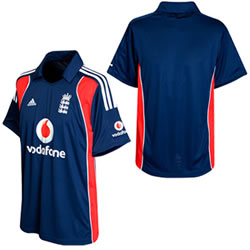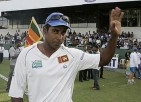The vicious circle of England’s ODI ineptitude
Richard Dickinson |
If, the day before the tournament begun, you had told an England supporter that their Champions Trophy would finish with semi-final defeat to Australia, the reaction would in all likelihood have been mild surprise. Precious few who had followed the 6-1 hammering at the hands of the green-and-gold boys which finished a few days before the Trophy begun would have been expecting much other than a fairly comprehensive set of three defeats in the three group games and an ignominious first-up exit. It is possible that the somewhat unexpected victories over Sri Lanka and South Africa might now have papered-over some cracks and allowed long-held pretences to continue to be held. In fact it is very likely that even if they do not, something else will, as precisely that has been happening for at the very least 8-and-a-half years now. England have gone nowhere as a ODI side in that time (it is also possible to argue that they had been going nowhere for the previous 8-and-a-half years as well) and the reasons have continued to remain depressingly identical: basic inability to recognise what it is that makes a good ODI cricketer, and the pretence – when the latest selection fails to perform – that the problems are with attitude and confidence rather than skill.
These inabilities are not confined to any one selector, nor one selection panel. It is an inherent problem, something exhibited by a great many people. The same problems are also prevalent elsewhere, but they manifest themselves in England more than any other side. The number of English cricketers with extraordinary skill at the one-day game has rarely been high; if the best one-day cricketers were routinely picked for ODIs, this would not be quite such a detriment to the England team. Other nations can afford to make a few more errors with selection. But if England want to be competitive on the World ODI stage, they have to get it right most of the time. Unfortunately, they have been failing to do so for sufficiently long to render this correspondent to near-despair that they ever will.
There are several factors that cause these near-endless mistakes by England selectors (and yes, it should be noted, not just England selectors) in ODIs:
One, the First-Class rather than domestic one-day game is routinely the one looked at when assessing players for ODIs. Test match success, or otherwise, is also often given too much credence. There is an inability to recognise how different the two games are, and it is almost certainly no coincidence that England were consistently one of the best ODI teams in the 1970s, 1980s and very early 1990s when there was far less difference than there has been since ~1992.
Two, bowlers are picked with penetration rather than accuracy in mind. Leaving aside the fact that the bowlers picked tend to be those who cosmetically look like they can consistently bowl wicket-taking deliveries rather than those who actually do (hence the preference of, for example, Liam Plunkett over, for example, Graham Napier), this fundamentally misunderstands the way the one-day game works. Inaccurate bowling will concede expensive economy-rates in ODIs regardless of whether wickets are falling; on the other hand, consistently accurate bowling will under the vast majority of circumstances result in a good economy-rate (and not a just-about-acceptable one, like 4.4-an-over; a properly good one, such as 3.6-an-over) which will, inevitably, then see the fall of wickets even if actual wicket-taking deliveries are not sent down. In the 50-over game, it is far, far better to pick an accurate bowler who cannot bowl wicket-taking deliveries than an inaccurate bowler who looks like he can bowl wicket-taking deliveries (or even an inaccurate one who actually can). England do not have many of the former, but the few they do have are routinely spurned in favour of many of the latter (the latter are also preferred to the bracketed). Obviously, if there are bowlers who can both contain and bowl wicket-taking deliveries then picking them is by a considerable margin the best option, but such bowlers have always been rare (in modern times England’s only two have been Darren Gough and Andrew Flintoff).
Three, when a batsman who gets picked for ODIs after some good First-Class performances and some poor one-day domestic ones then fails (most likely in the form of slow 20s and 30s) in ODIs, he is thought – by selectors and the commentators on television and radio – to be lacking confidence to go for his shots. When in fact the real problem is lack of the ability to play in the way that is required for the considerably different one-day game – apparent when consulting the batsman’s domestic failures; thus, to those who look, apparent before the selection is even made. Ever since the invention of the one-day game, there have been no shortage of England batsmen who enjoy reasonable – occasionally even excellent – proficiency at the First-Class game and are fairly incapable in the shorter one (a few examples: David Gower, Mike Gatting, Michael Atherton, Nasser Hussain, Mark Butcher, Michael Vaughan), which probably suggests that the emphasis on technical competence and copybook coaching handicaps batsmen in the shorter game at the expense of the longer. Whether this is justifiable is another matter entirely – few in England would argue with the premise that the longer game is much the more important – but it is noticeable that in other countries far more players are able to compartmentalise the two. Such players include the man who appears near-certain to go down as England’s best-ever ODI batsman, Kevin Pietersen, who essentially learned his cricket in South Africa before repeatedly being spurned forced him to find expression for his talent with England. But England’s best three ODI batsmen pre-Pietersen – Nick Knight, Graeme Hick and Neil Fairbrother – were all failures in Test cricket due to technical deficiencies. Only the two Grahams, Gooch and Thorpe, were able to learn their cricket in England and excel at both forms of the game (well, in fairness Dennis Amiss has a more than handy Test and ODI record, but the haphazard ODIs of the early- and mid-1970s are hardly comparable to modern times), though Alec Stewart gave it a decent shot. Marcus Trescothick, whose ODI credentials would be questioned by few, left the international arena with a few blanks – at best – still on his CV in the Test game.
Four, there is a constant preponderance for players who offer nothing much with bat or ball under most circumstances but will from time to time prove useful with either discipline. “Bits-and-pieces players” is the popular term, and the claim has been made numerous times (from several quarters) that England are moving away from them, sometimes despite evidence to the contrary being on the teamsheet on the very day the remarks are made. Luke Wright is the latest man to be elevated far beyond station; in previous times there has been Michael Yardy, Alex Loudon, Jamie Dalrymple, Rikki Clarke, Jeremy Snape, Paul Grayson, Vince Wells, Matthew Fleming, Dougie Brown, Ben Hollioake (who was taken so tragically young that no-one found-out whether he would or would not make the transformation to serious proposition), Adam Hollioake, Mike Watkinson, Neil Smith, and Dermot Reeve. Samit Patel and Ravinder Bopara have also been picked to fill the role, despite not-inconsiderable evidence of their potential as top-order batsmen who might bowl a bit from time to time (Bopara’s opportunities in this role to date have produced nothing to write home about). These players have all been and gone in no time – by nature it is rare for a player who obviously offers little to be kept around for too long – but given that time has run-out to find a suitable team in each of the last four World Cups, the fact that players who could fairly clearly be seen to not be up to standard before their selection have had games and games wasted on them is a considerable handicap.
It should be noted once again that there is nothing at all to suggest that a selection panel convened by any specific person or persons drawn from the generations which currently make-up selection panels would be able to do a better job on the England ODI team than the several who have tried in the last 17 years – it is not the fault of any one individual, but of a mindset ingrained in those of a certain age. England’s most recent ODI debutant, Graham Onions, made his bow to the sound of one television commentator (of a similar generation to current selectors, and who has in fact been involved with England selection in the past) asserting that “if he’s the leading First-Class wicket-taker in the country this season he should be able to get through 10 overs in a ODI”. Thus taking no notice whatsoever of the fact that Onions routinely struggles to make the Durham side in the shorter game. No, Onions’ stunning First-Class form and decent Test returns of 2009 were the only factors which had been considered in elevating him to ODIs – by the selectors and, in all likelihood, the overwhelming majority from their generation. The story has been the same so many times previously.
Even from the relatively limited confines of the CricketWeb forums, it is fairly clear that the generation which is now in their twenties and teens has a better grasp of the fact that the two forms of the game are considerably different than the majority of their predecessors – they have essentially known only the modern format of ODIs, with white balls, black stumps, coloured clothing, field restrictions and a situation where 4-an-over is an outstanding rather than upper-limit-for-acceptable economy-rate for a bowler over the long-term. Many still make the claim that the best way to get a good ODI side is to pick something as close as possible to your Test team.
England’s resources in one-day cricket at the current time are a little more considerable than they have been for a while. Pietersen, whenever he returns to the side, is in a class of his own, and it really does not matter tremendously whether he bats three or four, though three would perhaps use his stone to kill the most birds. Flintoff, if he returns, remains one of the best ODI bowlers around and a more than capable top-order batsman (though he is of little use as a late-order slogger and batting him at six or seven would be unlikely to help anyone). Graeme Swann is a spinner whose wiles place him alongside Daniel Vettori as something exceptionally rare – an orthodox (i.e., non-Doosra-bowling) fingerspinner who is still quite capable of containing (and thus, inevitably, dismissing) top-class batsmen in the modern ODI game, provided he is given grounds bigger than a postage-stamp and reasonable fields – i.e., not those of a Powerplay. Dimitri Mascarenhas, however many times he is spurned, remains capable of tying down batsmen in the middle overs on pitches which are not rank runways, and if bowled in tandem with Swann could have far more effect on the outcome of matches than he has so far (and Mascarenhas is also a capable lower-order hitter). Eoin Morgan, however much some may howl in protest at the fact that he has tripped across the Irish Sea to get to the top level, appears to have something of a gift for versatility precious few have ever demonstrated in England colours (in that way and only that is he similar to Fairbrother and Thorpe). Even Andrew Strauss, who was patently below ODI-class until very recently, has hinted in 2009 that he can provide a solid base to begin the innings – if not much else.
If bits-and-pieces players like Wright can be discarded, and if the insistence that Matthew Prior’s Test credentials mean he must also play ODIs can be overcome, then England have the backbone of a decent ODI team – to which complimentary players like Ryan Sidebottom, Paul Collingwood and Stuart Broad (all occasionally superlative if often inadequate) can be added and hopefully be under less requirement to produce something which they are not capable of. A side featuring Strauss (as captain), Pietersen, Jonathan Trott, Steven Davies or Craig Kieswetter (as wicketkeeper), Flintoff, Morgan, Collingwood, Mascarenhas, Swann, Broad and Sidebottom (one of Trott or the wicketkeeper would have to open the batting, despite probably being of most use at four) is considerably superior to anything England have had since 2000, when Trescothick, Stewart, Hick, Thorpe, Hussain, Flintoff, Craig White, Mark Ealham, Andrew Caddick, Gough and Alan Mullally lined-up together. It is not a side which would be especially likely to win the 2010/11 World Cup, because other sides have superior talent. But it would be a side which made best use of what was available and thus gave the best chance possible, rather than flailing desperately around attempting to be something which available resources simply do not allow.
In the estimation of this correspondent, however, the likelihood of that side ever appearing together is somewhere close to zero. The familiar ineptitude of England selectors and their television and print media reporting peers who fail to call-out their unacceptable reasoning has simply been going on too long to make the belief that remedy is just around the corner a palatable one. Perhaps the only way that England will cease to be hopeless at ODIs is if the format does indeed cease to exist, a scenario not a few in this country have confirmed in writing that they would welcome.





Whilst i might disagree with a few little things in the article, I think im pretty much in agreement on the whole, good article Richard
Comment by superkingdave | 12:00am BST 17 October 2009
Can’t believe the writer has tarnished David Gower with the same brush as the likes of Butcher, Atherton & Vaughan when discussing batsman who weren’t well suited to the one-day game. Gower played some of the great one-day innings in the 1980s & his career strike-rate of 75 was outstanding compared to the par strike-rate in his generation of about 60.
Comment by zinzan12 | 12:00am BST 17 October 2009
There is a relationship between FC and ODIs but there is also a relationship between OD and ODIs. Neither can really be separated. It has to be look at as a whole.
As a rule of thumb (and this like any rule is not hard and fast but should be used as a guideline rather than a template) players that do decently in both forms will do well in ODIs. Specialists dont really work.
Since 1992, 9 of the 10 players with the highest ODI batting average (20+ ODIs) for England have FC bat av of 40+ [B]and[/B] OD bat av of 35+ (Collingwood being the odd-man out).
Those that have done badly have do not have the same combined numbers.
I dont know the answer, but how many current England-qualified players fit that description? Id be interested in how many fit the bill.
Comment by Goughy | 12:00am BST 17 October 2009
Very good article with an extremely high level of analysis that you won’t often see on Cricinfo or in a Newspaper. I agree with a large majority of what was said and enjoy the quietly optimistic tone to the England ODI teams future (provided selectors get their act together and get out of the 1970s).
Comment by Manee | 12:00am BST 18 October 2009
In the last few years England’s ODI performances have been inconsistent but hardly terrible. On the plus side there have been away wins against Australia and Sri Lanka, home wins against India and South Africa and the recent semi-final spot. England doesn’t have a great talent pool in any form of the game so there is no particular reason to expect better.
Comment by Dissector | 12:00am BST 18 October 2009
Though I disagree with more of the points than I agree with, it is an interesting article.
I would mainly have argument with the title, though. I don’t think we’re inept, more mediocre, deserving of the ranking we have that puts in in the ‘second tier’ of ODI sides, but no higher.
Comment by four_or_six | 12:00am BST 19 October 2009
Looking ahead to England’s ODI series with South Africa, the recent form book would make England heavy favourites, since England have won 5 of their last 6 ODIs against South Africa. Any bookmaker who made England heavy favourites for the series however, would get cleaned out by a punter who knows anything about cricket.
Comment by GingerFurball | 12:00am BST 21 October 2009